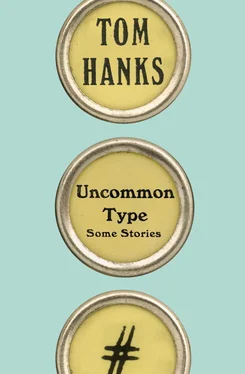Over pie and coffee, he relearned about Carmen and her niece—of the Radio Club and the roommates on East Thirty-Eighth Street. Everything was just as it had been. Then the past took a turn.
“Do you have anyone special in your life, Mr. Allenberry?”
Bert looked into Carmen’s eyes. Framed now in the décor of Borden’s Food Court, they’d turned an even deeper shade of green.
“She means are you married!” Virginia teased.
“Virginia! I’m sorry, Mr. Allenberry. I don’t mean to be forward, but I see you have no wedding ring and I just thought, well, a fellow like you must have someone special.”
“I’ve thought so, many times,” Bert said, wistfully. “I’m forever looking, I guess.”
“You bachelors are so lucky. You can wait and wait for the right girl to come along and nobody says boo .” She rattled off the names of movie stars and athletes who had yet to marry, names Bert did not recognize. “But us ladies? If we wait too long we become old maids.”
“Mama says if you don’t find a man soon, there’ll be none left for you!” Virginia giggled. “You’re almost twenty-seven !”
“You hush, ” Carmen hissed, reaching over with her fork to stab the best piece of crust, then popping it into her mouth.
“You dirty rat!” Virginia laughed.
Dabbing her lips with a napkin, Carmen smiled at Bert. “It’s true. I’m the last hen in the barnyard.”
“How old are you, Mr. Allenberry?” Virginia asked. “I’m guessing you’re like Mr. Lowenstein, my school principal. He’s almost forty. Are you forty yet?”
“Young lady, I am going to throw you into the Lagoon of Nations! Mr. Allenberry, I’m sorry. My niece has yet to learn the practice of tact. Maybe by 1960.”
Bert laughed. “I’m like your aunt Carmen. The last rooster in the barnyard.”
They all laughed at that. Carmen reached over and took his wrist. “Aren’t we a pair?” she said.
Bert should have excused himself right then. Six p.m. had passed. If a cab was available, he could be in room 1114 just in time for Progression. But this was his last day ever with Carmen. He would never see the woman in the green dress again.
Now, Bert Allenberry was a smart man, many say a genius. His invention of the Shuffle-Access Digital Valve-Relay had changed the world and garnered him the rapt attention of audiences at conferences full of movers and shakers—in Davos, Vienna, Abu Dhabi, and Ketchum, Idaho. He had teams of lawyers obeying his dictates, researchers and developers turning his ideas of whimsy into realities. He had more money than the GNP of most nations of the world, including those where he owned factories. He had donated to very good causes and had his name on buildings he had never even bothered to visit. He had everything a man—a very rich man—was supposed to have, need, or want.
Except for time, of course.
Chronometric Adventures said he had twenty-two hours of June 8, 1939, to do whatever he wanted. But now, what he wanted was to stay awhile. There must be some wiggle room, right? After all, Progression, or was it Reprogression—he was never sure—could not begin until his body, all his atoms and molecules, were in place in room 1114 of the Hotel Lincoln on Eighth Avenue. He understood why Chronometric Adventures demanded such terms—to cover their asses! Why did he have to be in that tight compression suit and on that bed according to the tick of the clock? Was he Cinderella at the Ball? Why couldn’t he saunter into the room at, say, midnight, then slip into that rubber suit and then whoosh away? What was the big deal?
“Have you seen the Time Capsule?” he asked Virginia.
“I read about it in school. It’s buried for the next five thousand years.”
“They have what’s in it on display in Westinghouse. Electro the robot, too. Do you know what television is? You just have to see television.” Bert was rising from the table. “Shall we go to Westinghouse?”
“Let’s!” Carmen’s eyes were smiling again.
The Time Capsule was loaded with silly stuff—Mickey Mouse comics and cigarettes and whole sets of books printed on microfilm.
Though the Time Capsule and Electro were impressive, television was what had Virginia over the moon. She could see her aunt and Mr. Allenberry on a small screen, in black and white, almost like they were stars in a movie, but their images were in miniature, projecting from a screen in a cabinet no bigger than the radio at home. In fact, they were in another room, standing in front of a camera, one unlike any she had ever seen, and they were also in front of her. The vision was thrilling. When they switched places, Virginia waved and spoke into the microphone: “This is me, on the television saying hello from right here and you can see me right there !”
“Look at you!” Carmen said. “You look so pretty! So grown up! Oh, Bert!” She turned to him. “This should be impossible, but here it is!”
Bert was looking not at Virginia on the screen but at Carmen. He was thrilled that he was no longer Mr. Allenberry.
Checking his watch, Bert saw that it was 7:06. The deadline had passed, the twenty-two hours were up, and, lo and behold, there was wiggle room!
They visited the DuPont, Carrier, and Petroleum Industry Buildings, none of which had the socko exhibits to match television. The Glass Building, the American Tobacco exhibit, and Continental Baking were just time killers; the longer they lingered in them the sooner came darkness and the light show.
After watching films of water-skiers in the Academy of Sports, he bought cups of ice cream, which they ate with little wooden spoons.
“Here’s our spot for the show!” Virginia claimed a bench for the three of them. In the growing indigo of the evening, they could see all the way from the Lagoon to giant George Washington, silhouetted against the Perisphere, surveying the great nation he had sired. As night fell, the buildings of the Fair became so many tracings of brightly lit lines on deepening black. The skyscrapers of Manhattan lit up the horizon. The illuminated fairground trees looked to be glowing from within, from their own inner light.
Bert Allenberry wanted this night to last forever, for all time. He wanted to sit beside Carmen at the Lagoon of Nations, listening to the murmur of the Fair, with her scent of lilac and vanilla stirring the warm air of 1939.
When Virginia collected their ice cream cups and took them to a trash bin, Bert and Carmen were alone for the first time ever. He reached for her hand.
“Carmen,” he said. “This has been a perfect day.” Carmen was looking at him. Oh, those hazel eyes. “Not because of Futurama. Or television.”
“Elsie the Cow?” Carmen said, her breath catching as she smiled.
“Would you allow me to give you and Virginia a ride home when the Fair closes?”
“Oh, I couldn’t do that. My sister lives too deep in the Bronx.”
“We’ll take a taxi. Then I can drop you off at your place. On East Thirty-Eighth Street.”
“That would be very kind of you, Bert,” Carmen said.
Bert wanted to hold Carmen in his arms, to kiss her, maybe in the back of a taxi on East Thirty-Eighth Street. Or, in room 1114. Better yet, on the one hundredth floor of his building at 909 Fifth Avenue.
“I’m glad I came to the Fair today.” Bert smiled. “So I could meet you.”
“I’m glad, too,” Carmen whispered. Her hand never left his.
Music began to play from speakers hidden around the Lagoon of Nations. Virginia ran back to the bench just as the fountains shot water into the sky, lights turning the geysers into columns of liquid color. Every patron of the Fair stopped to watch. Projections turned the Perisphere into a luminescent ball of clouds.
Читать дальше











